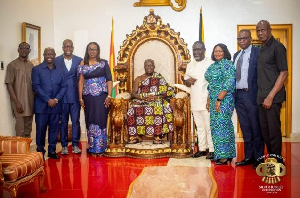- Home - News
- TWI News | TV
- Polls
- Year In Review
- News Archive
- Crime & Punishment
- Politics
- Regional
- Editorial
- Health
- Ghanaians Abroad
- Tabloid
- Africa
- Religion
- Election 2020
- Coronavirus
- News Videos | TV
- Photo Archives
- News Headlines
- Press Release
General News of Thursday, 22 March 2007
Source: GNA
Minister questions WTO Call for internalisation of education
Accra, March 22, GNA - The call for internationalization of higher education by the World Trade Organisation is posing major threats to the
current transformation process on the African continent, Papa Owusu Ankomah, Minister Education, Science and Sports said on Thursday. He said: "The dangers of liberalization are considerable, given the level
of development of the African Higher Education system relative to that of industrialized countries." Education is included under WTO's General Agreement on Trade in Services (GATS) designed to increase trade liberalization internationally.
Speaking at the opening of a forum by the UN Educational, Scientific and Cultural Organisation on Higher Education, which is the Second Regional Research Seminar for Africa, Papa Owusu Ankomah noted a growing resentment to treating education in the same manner that the WTO trades goods and services.
This, he said, was rested upon the disaster that trade liberalization had had on poor people over the two decades. The Association of African Universities (AAU) is organizing the Forum on behalf of the UNESCO Regional Scientific Committee for Africa under the theme; "The Contribution of Higher Education to National Education Systems: Current Challenges for Africa." Spanning March 22 to 24, the Forum would deliberate on five key areas - teacher education, non-formal education, continuing education, technical and vocational education and research in education. Papa Owusu Ankomah said responding effectively to the commercialisation of higher education and the proliferation of open and distance learning opportunities called for innovations, not only in course provision to ensure relevancy, but also in revenue generation, quality assurance, institutional governance and human resource management.
"...Higher education institutions in Africa must address a whole range of other issues which include better access for certain groups such as women and the poor, intellectual property rights, research methodology, the brain drain and the threat posed by HIV/AIDS. "The African faculty is 'greying' as the first and second generations of academics reach retirement and are not being replaced at the rate and at the levels of quality required by the new demographics and knowledge demands."
He said "brain drain" was caused by the fact that higher education systems had became less competitive as regards the financial rewards they offered teaching and management staff and were less capable to offer possibilities for original research.
Papa Owusu Ankomah said despite the promise that technological renaissance held the key to Africa's rapid transformation, the continent had been unable to take advantage of its full potential. He said Africa needed to remind itself that the current situation of the African higher education system was part of a change process, with a past shaped by many factors, a complex and evolving present and a future that could go a number of different ways.
The Minister commended UNESCO for its work in pushing forward Africa's education agenda and added that there was the need for the continent's higher education system to be assisted to link more fully into the global knowledge networks.
Giving an overview of the educational system in African, he said during the 1980s and 1990s, the significance of higher education was downplayed in favour of basic education by key international institutions such as the World Bank and even African governments. He said but for the interventions and resilience of continental bodies such as the Association of African Universities and a few other African institutions, higher education would have suffered.
Welcoming delegates and observers from Africa and other parts of the world, Professor Akilagkpa Sawyerr, President of the AAU, said the priority placed on basic education at the expense of higher education came at the time that global movements were putting higher level knowledge and science at the centre of development and national competitiveness.
"It is to the credit of UNESCO and a few far-seeing donors that they did not succumb to this one-sided view," he said. Prof. Sawyerr said the AAU consistently resisted the approach not for self-interest of its members, but in the firm conviction that failure to adopt a system-wide approach that treated the national system of education as a system...strikes a grievous blow to prospects for sustainable development.
He said there was the need to note the importance of the systemic relationships between higher education and the other levels of education saying, "what remains is to understand the nature of these relationships and to reinforce them".
Dr Mary-Louise Kearney, Secretary to the UNESCO Forum, said the seminar would prove a landmark in the debate on the role of higher education in relation to the education systems of the Africa region. She said it was important that universities stood tall in order to respond effectively to the many issues related to the socio-economic and cultural evolution of their regions within the overall context of a globalize world.










